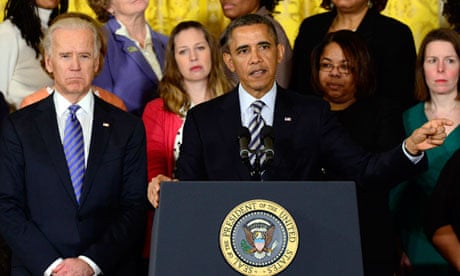President Obama tried to breathe new life into his stalled gun control agenda on Thursday, but will he have any impact? He may not have a choice: it looks like some kind of action on his part is the only hope for reform.
Over the past few weeks, the percentage of Americans favoring new gun control regulations have dropped across the board. Fox News polling saw support for background checks with new gun purchases fall by 6pt, to 85%; mental health checks by 11pt, to 72%; new ammunition limits by 10pt, to 70%; high-capacity magazines bans by 2pt, to 54%; armed guards in schools by 9pt, to 51%; and assault weapons bans by 3pt, to 51%.
The good news for those favoring tighter gun control is that most of the specific proposals still have majority support. Background checks, the center of the White House's gun control package, still have 85%, per Fox News; and 90%, per CBS News. Even the long-doomed ban on assault weapons is at 51% and 49%, per Fox and CBS, respectively.
Of course, the issue has always been that any gun control package presented by the president would ultimately become polarized along party lines. That is, people may support specific measures in theory, but they'll disagree as soon as it becomes "President Obama's gun control plan".
We haven't had any polls attach Obama's name to gun control questions in the past few weeks. We have had broader gun control questions, though, that generally matched Obama's past proposals. I also feel these broader questions do a better job measuring the public will on gun control legislation.
The drops in support for strong, broad gun control measures have been dramatic. CBS found the percentage of Americans who want stricter regulations fell from 57%, immediately following Newtown, to 47% now. And 50% of Americans saw no need for stricter regulations, or preferred, in fact, loosening gun restrictions.
Only 43% of Americans said that they wanted to put major restrictions on gun ownership or make them illegal, in the latest CNN/ORC poll. That's down from 52% post Newtown. Meanwhile, the percentage who wants only minor or no restrictions is at 55% – the highest percentage ever measured by CNN/ORC.
What happened here?
Part of it, no doubt, is that President Obama's overall popularity has dropped off in recent weeks. I noted previously that his overall approval was highly correlated with support for his gun control package. That's why you see red state Democrats hesitant to get behind background checks, even as they poll at astronomical levels.
The other cause is that gun control has left the news. As I spoke about previously, the spike in support for tighter gun control after Newtown was reminiscent of trends after the Columbine massacre. These two gun tragedies were unlike others, such as the Aurora, Colorado theater shooting, because they became remained top news stories or some time, and were thus able to enter the public consciousness.
Eventually, however, Columbine received less and less news coverage, and the polling bump faded. We can check for the same pattern with the Newtown shootings by searching the News Library archive, which tracks newspapers and television transcripts.
In the month following the Newtown tragedy, the phrase "gun control" was mentioned 23,484 times. In the second month, it actually climbed slightly to 23,506. During March, through Wednesday, the number dropped to only 9,238. Now, that's still much higher than the 1,243 mentions in the month prior to Newtown, but you don't have to be a statistician to see the downward trajectory.
The president can help gun control reenter the news, and thus the minds of Americans. Danny Hayes found that in the week following the president's initial announcement of his plans, the press mentioned gun control twice as much as previously. During that same period, the percentage of Americans who wanted tighter gun control barely strayed from the post-Newtown high.
One might expect that a similar news spike and rebounding of support for stricter gun control can happen, given President Obama's new push.
This not to say that the president can convince the American public of something that they don't believe. What he can do, according to research by Brandice Canes-Wrone on budget issues, is take stalled, popular proposals, and create a campaign issue out of them, thus convincing Congress to act. Background checks are, as Mark Blumenthal pointed out, the perfect example of a policy that is massively popular – and going nowhere in Congress.
We already see Democratic donors and grassroots organizations following Obama's lead, and trying to turn background checks into a campaign issue. As reported by Greg Sargent, top Democratic donor Kenneth Lerer won't give money to Democrats who don't back gun control. The Daily Kos' Markos Moulitsas followed up this report by hoping:
"It is a start of a trend. Too many big liberal voters have given to the party and candidates uncritically in the past."
Of course, this could all easily fail. The president could simply polarize the debate even more. This campaign may make red state Democrats even more squeamish, and will almost certainly make the Republican-controlled House even less likely to move towards more regulation.
But right now, the issue is already polarized. Gun control has gone nowhere in Congress, while the president was saying little. Nationally, public will on the issue is fading. The situation for gun control advocates could hardly be worse, in fact.
The flipside, though, is that by speaking, Obama can engage and activate a public that is still firmly in favor of background checks. He just might be able to change the dynamic and make politicians recognize that, politically, they are on the wrong side of the issue. Thursday's speech was a start, but it's all uphill from here on.
